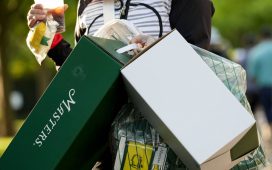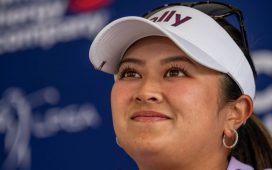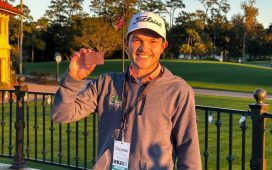BROOKLINE, Mass. – Over three decades, fans of Phil Mickelson have become accustomed to his shortcomings at the U.S. Open. There’ve been three solo second-place finishes, a trio of ties for second, and a couple fourths, each failed tilt at the National Open—30, in all—making its own fibrous contribution to his scar tissue. Not since the rain-plagued 109th Open at Bethpage Black has Mickelson authored one of his disappointments on a Monday, but he got it out of the way at the 122nd Open before most fans were even on the grounds at The Country Club.
Mickelson’s press conference was his first time facing U.S. media since becoming the poster boy and most prominent apologist for LIV Golf, the series of sportswashing events funded by the Saudi Arabian regime that kicked off last week in the U.K. Questions were plentiful about his new venture—which earned him a suspension from the PGA Tour but not from the U.S. Open, where Jay Monahan’s writ does not run—but meaningful answers were scarce. Instead, Mickelson produced an exercise in evasions that would rival a pitcher dodging line drives at Fenway.
When a reporter raised the highly critical letter sent to him and other Saudi-allied players by the families of victims of the September 11 attacks, Mickelson cut her short. “I’ve read all that. Is there a question in there?” he snapped.
There was: “How do you explain to them—not to us, to them—what you have decided to do?”
“I have deep, deep empathy for them,” was all he could muster.
Another questioner asked if he was concerned that his fan base might shrink now that he’s aligned with Saudi sportswashing. Mickelson responded by scolding the reporter for posing several questions in one, none of which he was particularly keen to answer. “If fans would leave or whatnot, I respect and I understand their opinions,” he replied. “I understand that they have strong feelings and strong emotions regarding this choice, and I certainly respect them.”
Nothing by way of explanation for his choice, merely trite expressions of understanding if anyone is upset by that choice.
There were umpteen other inquiries that Mickelson didn’t much care to delve into, among them his relationships with other players, his standing with sponsors, his concept of legacy, his future on the PGA Tour, and even the motivation behind LIV. “I’ll have to defer to those at LIV Golf. It was their idea. It was their brain trust or child, their thoughts and ideas that they brought to fruition,” he said, perhaps forgetting that he previously admitted to working on the founding charter for LIV.
Even when lobbed a relative softball—Has the criticism he’s faced been unduly harsh?—he weaved, opting not to address the criticism, nor why it has been leveled, but instead offering another hackneyed evasion. “The important thing is that everyone is entitled to their opinion. I understand that it brings out a lot of strong emotions for a lot of people, and I respect the way they may or may not feel about it,” he said. Thus he cast his dismissal of Saudi human rights abuses and his eagerness to auction professional golf to MBS as a mere difference of opinion, on a par with choosing Clemens over Pedro as the greatest Sox pitcher in a barroom vote.
Twice Mickelson did offer rationales on how LIV will be “transformative.” One was the team format, which drew tens of (non-paying) spectators at the Centurion Club near London last week, and not many more to the livestream. The other was geographic. “I believe moving tournaments throughout the world and bringing that type of championship golf to different parts of the world is going to have a very positive effect globally on the sport,” he said.
In just the last 20 years, the PGA Tour staged 98 tournaments outside the domestic U.S. in 13 countries. Mickelson competed in barely a quarter of them. His unconvincing attempt to position himself as a missionary for the game merely exposed him as a mercenary.
“There’s an obvious incredible financial commitment,” he finally admitted, “but more than that for all the players involved there are other factors that with fewer tournaments, it allows me to have more balance in my life.”
More than once, Mickelson reminded us that he earned lifetime membership of the PGA Tour and that he intends to keep it. He didn’t acknowledge how that lifetime member status already allows him to set his schedule, and has done since January of 2002, when he won his 20th title. He is not obligated to make a minimum number of starts on the PGA Tour, but he is so bound with the Saudi series.
This U.S. Open will illustrate why the Saudis paid Mickelson an exorbitant amount of money. It’s not for the competitive relevance of a 52-year-old. He’s at The Country Club as a Manchurian competitor.
By strolling the fairways giving thumbs-ups, a cheesy grin affixed like an identikit picture, and accepting the warm applause of galleries, Mickelson will further assimilate his actions, and signal to others who might be on the fence that pariah status isn’t assured outside the ropes. He serves other functions too. LIV Golf assured prospective recruits that they can play the series and major championships, so it’s vital that their stooges who are currently eligible for majors show up and reinforce that perception.
Mickelson has now cheapened two consecutive majors—the PGA Championship, by not defending his title and instead using it as a tease to build anticipation for his eventual return a few weeks later for the Saudis, and now the U.S. Open, reduced to a platform for normalizing sportswashers. For him, the majors are just collateral damage, something his Saudi benefactors are familiar with as a cost of doing business, whether launching a hostile takeover of golf or missiles at Yemeni civilians. Mickelson is also clearly establishing himself as the most likely plaintiff in whatever future legal action the Saudis finance over his suspension from the Tour or any potential sanction by the majors. His lifetime Tour membership and exempt status into all majors for several more years explains his value to MBS and his minions.
As the press conference wound down, Mickelson was asked if he’s at peace with perhaps never playing again on the PGA Tour. He sounded a touch sentimental. “I am very appreciative of the many memories, opportunities, experiences, friendships, relationships the PGA Tour has provided, and those are going to last — those will last a lifetime,” he said, with a wan smile.
In that, Mickelson was correct. Memories do last a lifetime. But then, stains do too.








